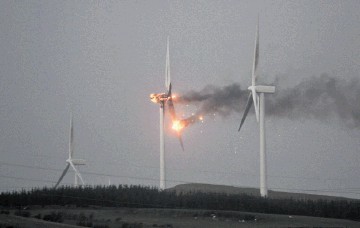There is undoubtedly a connection between local climate change and increasingly severe weather conditions.
In the UK, the Met Office has been designating storm names for a decade now. These storms have been arriving with increased frequency, often leaving destruction in their path. The 2023/24 storm period witnessed 12 named storms, the highest number of named storms since the inaugural season in 2015.
Storms frequently result in destruction to the infrastructure that supplies our energy and to the individuals responsible for keeping the lights operational. These weather events can inflict billions of pounds worth of damage and can jeopardize lives.
As the UK braces for the effects of Storm Eowyn, which is delivering gusts reaching 100mph across Ireland and Scotland, we have compiled some significant repercussions that recent storms have caused.
Wind turbine ignites
A wind turbine ignited as hurricane-strength winds struck parts of Scotland in 2011. Firefighters were summoned as the towering 330ft turbine in North Ayrshire caught fire in the afternoon. However, the fire extinguished within minutes after their arrival.
North Sea rig adrift
Numerous workers were evacuated following Storm Babet in 2023 when a North Sea oil rig east of Aberdeen lost its anchors amid raging waves. Forty-five non-essential personnel aboard the Stena Spey were airlifted to alternative locations after four out of eight anchors became unmoored due to the severe weather.
WATCH:
Wind turbine loses blades
In December 2023, an Ayrshire wind turbine lost its blades and collapsed as it was pummeled by Storm Gerrit. A bystander captured the remarkable moment as the 35m turbine at Auchencloigh farm spun wildly out of control.
Irish Sea oil rig evacuated
Last year, 30 workers were evacuated from this oil rig in the Irish Sea, but it was a precautionary action to ensure their safety. Petrofac (LON:PFC) confirmed that 27 personnel aboard the Irish Sea Pioneer in Liverpool Bay were evacuated in advance of Storm Darragh.
Numerous North Sea helicopters stranded
Storm Eunice caused the cancellation of numerous North Sea helicopter flights in 2022. Collectively, the four helicopter operators CHC, Bristow, NHV, and Offshore Helicopter Services (formerly Babcock) delayed or canceled 28 flights going to and from oil and gas facilities.
Additional groundings and evacuations
Weather conditions led to the evacuation of several North Sea platforms and a multitude of canceled flights in 2021.
BP removed 108 non-essential workers from its ETAP platform, located approximately 100 miles east of the Granite City, while another 38 crew members were taken off the company’s Andrew installation.
A spokesperson for the oil and gas giant stated: “The safety of our personnel is always our top priority, and these precautionary actions are well entrenched in our operational procedures.”

